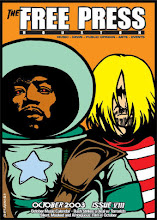In The Loop

Films as satirically savage and unrelentingly funny as In The Loop come around on few and far between occasions. In The Loop continues the adventures of political spinmeister Malcolm Tucker first seen in a BBC series from 2005 called The Thick of It. I've never seen TToI but I intend to find and watch all nine episodes because if it's only half as funny as In The Loop it must be funnier than everything else out there now.
Peter Capaldi plays Tucker with venom and condescension hissing constantly from his mouth. His tour de force performance is matched by the large ensemble cast (of at least ten others), all brimming with secrets and barbed wit. The film marks the feature debut of Armando Iannucci (also one of five writers) who's instantly on my to-watch list. The script has so many plot nuances, so many zingers, and characters are so illuminatingly etched with the fewest lines that it begs to be seen multiple times.
Following the storyline requires some knowledge of English accents and politics. Places like 10 Downing Street are used as establishing shots with the same casualness as the same defining angle of say the White House or the United Nations. The action shifts from Northhamptonshire to Washington D.C. to New York City with the flick on an eye. The less I concentrate on the actual plot the better the film will be for viewers tantalized by the prospect of seeing a political spoof on par with the best films of that genre. Suffice it to say the main point deals with the behind the scenes struggle of political operatives to provide information that will lead to a vote of yeah for war at the UN.
Some of the actors you'll recognize includes David Rasche's Machiavellian Secretary of Defense and James Gandolfini's seemingly peaceful but politically bloodthirsty three-star Pentagon general. More savvy film fans will cheer British thesps like Gina McKee and Tom Hollander. Another character I was sure I knew but had to wait for the credit roll for her name was a departmental aide whose political paper on the pros and cons of war provide a lot of In The Loop's skullduggery. Hello it's Anna Chlumsky of My Girl all grown up and kicking up a dust in the corridors of power. Steve Coogan gets a brief moment to steal as a common man who just kind of wanders into the morass of political opportunism.
All throughout In The Loop the characters seek to undermine and outthink everyone else around them. In the end some have achieved their goal while others have had their comeuppance. The camerawork offers that immediate in-your-face style also seen for instance in the British version of The Office. The ease of conviction with which these sanctimonious wankers play with the reality of war means anything can happen. There's also a hilarious sling of the arrow to I Heart Huckabees that shows Iannucci's heart is in the right place.









